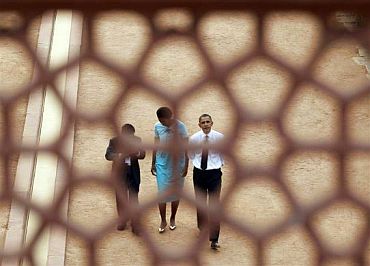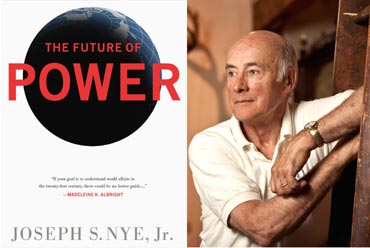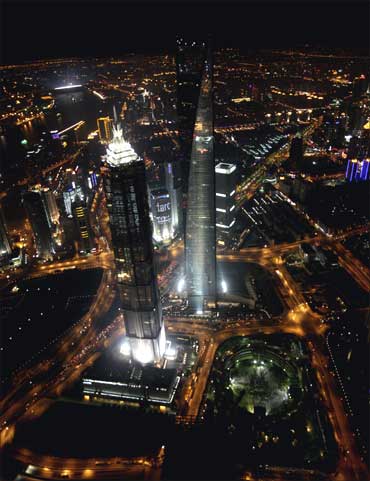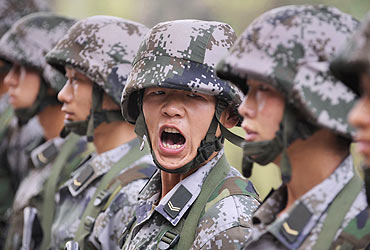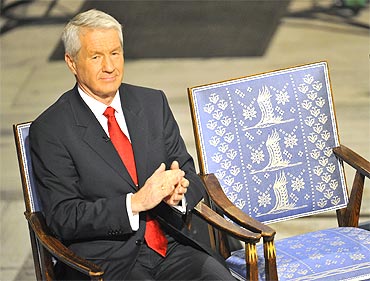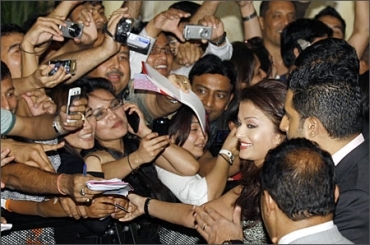 | « Back to article | Print this article |
'India DOES NOT want to be America's ally'
India has no intention of entering into a strategic alliance with the United States, but it has deep concerns over China's growing assertiveness towards New Delhi and the region as a whole, believes Dr Joseph S Nye, Jr.
Nye is a distinguished service professor at the Harvard University and author of the just published book The Future of Power.
Nye had met Prime Minister Manmohan Singh, Foreign Minister S M Krishna and other senior government officials in January in New Delhi.
He made the comment during an interaction that followed his remarks at the Centre for Strategic and International Studies, a leading Washington, DC think tank, on his new book. Responding to rediff.com's question on whether he sees India as a counterweight to China, Nye said, "My argument is a little different from that."
Reportage: Aziz Haniffa in Washington, DC
'India's concerns remain intense'
In a recent article titled Asia in the Balance, Nye had said, "Indian officials are generally discreet in public about relations with China, but in private, their concerns remain intense."
And he went on to predict, "Rather than becoming an ally, India is more likely to become one of the Asian countries that will tend to balance China's strategic rise."
Nye is the erstwhile dean of the Kennedy School of Government at Harvard University and former chairman of the National Intelligence Council. He had also served as the assistant secretary of defence for International Security Affairs in the Clinton administration. Eminent journalist Fareed Zakaria had once described him as the 'country's best thinker on international affairs'.
'India and US are fated to be closer'
"I was in Delhi last month and met with the prime minister, foreign minister and others," said Nye, adding, "India and the United States are fated to be closer together."
He argued, "What Manmohan Singh made very clear -- and others too -- they don't want this (the US-India partnership) to be phrased as an alliance," thereby finding erstwhile prime minister Atal Bihari Vajpayee's coinage that New Delhi and Washington are 'natural allies' to be an anathema.
But Nye said that whenever one talks "about the rise of Asia, if you move carefully, you'll notice, you have Japan, you have India, you have Vietnam, the Association of Southeast Asian Nations group, and each of these countries is concerned about the rise of Chinese hard-power."
"And, the extent to which China begins to throw its weight around, the more it pushes those countries in a closer relationship with the United States," he added.
Are we moving towards an economic 'Chindia'?
However, Nye reiterated, "For many internal domestic political reasons, it's inconvenient for Indians to call it (partnership with the US) an alliance."
"So, unlike our relationship with Japan, which clearly is an alliance, I don't think we are going to see an alliance with India in that same sense. But, we are going to see a closer alignment between India and the United States," he said.
And, then, according to Nye, "That is going to be reinforced by the fact that we have a lot of close interests -- our economic interests with India are growing, the Indian Diaspora is an enormously successful part of American economic and political life and there's this old cliche, but it's nonetheless true, we are both democracies and that matters."
In a recent article, Nye had noted how "official pronouncements stress friendly relations between India and China, and some trade analysts argue that the two giant, rapidly growing markets will become an economic 'Chindia.'
'Border dispute remains unsettled'
He also recalled how when Chinese Premier Wen Jiabao "visited several years ago, he signed a comprehensive five-year strategic cooperation pact," and that "Indian Prime Minister Manmohan Singh put it at the time, 'India and China can together reshape the world order.'
But Nye argued that while "such statements reflect a considerable change from the hostility that bedeviled Indian-Chinese relations following the two countries' 1962 war over a disputed border in the Himalayas, nevertheless, strategic anxiety lurks below the surface, particularly in India."
"China's GDP is three times that of India's, its growth rate is higher, and its defence budget has been increasing," he wrote.
"The border dispute remains unsettled, and both countries vie for influence in neighbouring states such as Myanmar. And, in recent years, China has worked behind the scenes to prevent permanent Security Council membership from conveying great-power status on India," he observed.
China trying to increase soft power
During his interaction at CSIS, Nye reaffirmed the point made in his book -- it's not hard or soft matter that matters in today's world, but it's a combination of smart power that's going to be crucial for effective strategies. Nye said, "It's always interested me to see the Chinese pick this up."
He spoke of how in 2007, President Hu Jintao told a Communist Party congress that China needs to increase its soft power. "That's a smart strategy if you are a country whose hard power is growing -- economically and militarily -- and you know you are going to frighten your neighbours and they will create coalitions against you. But if you develop your soft power at the same time, you are less likely to develop those coalitions."
"But the problem is the Chinese have great difficulty in implementing it," said Nye, adding, "All these investments in the Beijing Olympics and other such things are terrific, but then they go throw (Nobel Peace Prize laureate) Liu Ziaobo in jail and undercut the billions of dollars they are spending on Confucius institutions and so forth."
'Bollywood projects Indian soft power'
He said that Hu and the "top Chinese leadership is smart enough to know that soft power is a useful part of their overall strategy, but they are trapped by their own authoritarian system in terms of how they do it."
But on the other hand, Nye said, "Look at India and Indian soft power. Bollywood makes more films than Hollywood. China doesn't lack talented actors and actresses and film directors. But they don't lack censors either."
"And, the fact that Chinese films are censored so much means that they can't get that body of mass appeal," he said, and reiterated, "So, the locking up of Liu Xiaobo is an overreaction to the Nobel Peace prize. It was a case of China shooting itself in the foot."
But Nye argued, "Even if they hadn't done that, they still are not going to be able to wield soft power until they get a changed political system."
